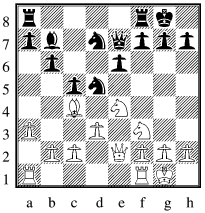
November 2012
Division 1
|
Division 2
|
Holmes Chapel Kings have been quickest out of the blocks in division one, their 5 - 0 thrashing of Newcastle A an obvious statement of intent to be involved in the shake up this year. Already they have matched their last years wooden spoon points total. However I find it difficult to look beyond Cheddleton for champions.
Division two has shrunk by one team since last season, the exits of Fenton A and Alsager B being partially balanced by the appearance of a second Cheddleton side. Most of the sides look evenly balanced so that individual match results will be difficult to predict. Defending co-champions Knights and Newcastle B will want a say in the destination of the title, but the Cheddleton twins, with strong top boards and dangerous juniors at the bottom look menacing. Those other perennial challengers Macclesfield have had a slow start. Rule them out at your peril.
Division 3
|
Division 4
|
Fenton v Cheddleton has been the theme of division four in the six years since its reintroduction, with he titles shared equally. Will this year be any different? The early tables say no.
The two first round matches in the Open Cup both went to board count, with Stafford and Newcastle winning chess's version of the penalty shoot-out, whilst the other cup match, in the Perry Trophy competition, featured the only defaulted board of the season so far. The Perry is also the most restricted of our competitions, so the first default appearing here is not the most surprising turn of events.
Postponements are well down, with just three so far, one of which has already been played. In previous years the start of the season seems to have taken some clubs by surprise with multiple postponements setting the tone for the year.
One hundred and forty two players have set foot in our competituons so far, with forty two (of course) having played the four games necessitating ECF membership. Included in this number are the twenty six who already feature prominently on my performances page by dint of their five plus games.
Finally some names I've not seen before. David Millington, Carmel, Paul and Isaac Barwick, Ted Fletcher, Julian Hawthorne, Daniel Goodman, Gwyn Price, Charles Walker, Ben Lack and David Meakin. a lot of new players for this early in the season. Welcome to the league.
comment on this article
Inevitably within what is a relatively modest sized district any new event will to some extent provide more games against the usual suspects, so the format is deliberately abnormal so as to give a different feeling to affairs. The Doubles does not involve alternate moves or consultation chess; it is a five round team of two event with each player gets their own half-hour games which can thus be graded.
There will be two sections referred to by the limit on the partners total grade: the 320 section which carries no minimum counting grade and so is open to anyone with a suitable partner, and the 220 section which carries aminimum counting grade of 80 and so effectively a maximum allowable one of 140.
Teams will be known by their names, say Smith & Jones, rather than by club, and indeed we see no reason why they should be from the same club. We are however restricting the event to North Staffs so as to ensure that bronze membership of the ECF is sufficient. Nominally teams events should be bronze anyway, but I'd rather not put the ECF to the test on teams of two. Which reminds me I have things to say about the implementation of the ECF membership scheme, but that can wait for another article.
Another difference from normal practice is that we are not going to have board order rules. Instead before play commences each pair nominates who will be white in each round - yes that does mean that if you are providing transport you can insist on five whites. In each match your designated white plays their designated black.
Unfortunately the venue is not free, so we are charging £2 a head to cover costs. Shouldn't break the bank.
How will it all work out in practice? Time will tell. But I hope many of you will be tempted to come along and play your part. Get your entries in to me, or to the Blackburns if you are from Holmes Chapel.
comment on this article

|
| Ian Chester v RR after 12 ... N(b8)d7 |
13 ... Nf4, 14 Qe3 Ng6 wanting to play Qf6 instead, but feeling nervous about her majesty's continued ability to protect the knight.
15 d4 Effectively the losing move Bxf3 Ian is confronted with the unpalatable choice of losing his d-pawn or having his kingside pawns shattered by recapturing with th g-pawn.
16 Qxf3 cxd4, 17 Qe4 Qc5, 18 Bd3 Nf6
19 Qe1 Rad8, 20 Ne4 Nxe4, 21 Qxe4 e5 Central pawns start to roll
22 g3 f5, 23 Qe2 e4, 24 Bc4+ Kh8
25 Rad1 Ne5 26 Ba6 Nf3+ 27 Kg2 Rd6 Will I be permitted a quick kill?
28 Qc4 I can see a nasty accident coming his way!
28 ... Qe5, 29 Qc7 Yes!! Rh6 0-1
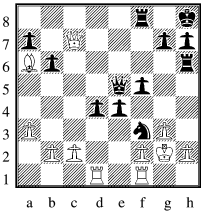
|
| Ian Chester v RR final position |
Exhibit A comes from the first round at Torquay in which RR had black against Alan Papier.
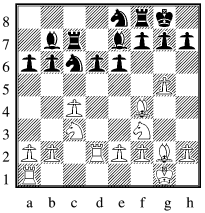
|
| Alan Papier v RR after 16 R(d1)d2 |
16 ... f6, 17 Rad1 fxg5, 18 Bxg5 Black is fine, but started to feel uncomfortable about he number of ways white could pressurize his hanging central pawns, so went for a simplifying combination:
18 ... Rxf3, 19 Bxe7 Rxc3 20 Bxd6 Seeing combinations through to their fonish at the outset is not always easy to do, so it is sensible to reassess as the combination is played out. RR failed to do this and so saved the wrong rook:
20 ... Rxc4, 21 Bxc7 Nxc7, 22 Rd7 Na5 which is really as far as I'd seen clearly at the outset along this line. Now RR experienced a sudden panic about b4 though Alan chose the highly effective
23 Rd8+ Kf7, 24 Bxb7 Nxb7, 25 R1d7+ Kf6, 26 Rc8 and the resulting material loss is decisive even though as is his wont, RR extended the game to move 60. I won't bore you with the details of the second half (movewise) of the game.
Instead 20 ... Nxd6, 21 bxc3 Nxc4, 22 Rd7 Rxd7, 23 Rxd7 N4a5 and both sides will struggle to make progress. Blacks pieces are all tied down, but white cannot put his pieces to use without freeing blacks. White's lack of a b-pawn in this variation is critical.
Taking the wrong line in this combination is certainly an error on RR's part.
And what of the missed opportunity?
16 ... Na5, 17 b3 Nxc4, 18 bxc4 Rxc4 forking knight and bishop. RR emerges two pawns up, though his pieces are slightly awkwardly placed, so he doesn't have the full benefit of the material advantage.
comment on this article
The morning saw RR paired with white against Terence Greenaway.

|
| RR v Terence Greenaway after 15 ... f6 |
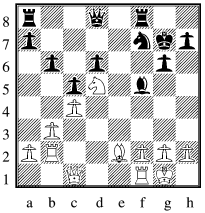
|
| RR v Terence Greenaway after 21 Nd5 |
22 Qc3+ Ends the game as a contest Ne5
23 f4 Bxd5, 24 cxd5 Rxf4 Panic mode
25 Rxf4 Qg5, 26 Qg3 Qxg3, 27 hxg3 Re8
28 Rd2 Nd7, 29 Bb5 Re1+, 30 Kf2 1-0
comment on this article
| Jurgen Nielsen v RR after 14 c3 |
16 Ngf5 Kh7 Removing a pair of knights is better
17 Nxd6 Qxd6, 18 cxd4 cxd4 Did I really recapture that way? Fraid so. Is there a name for a fear of an opponent playing f4? Birdophobia? And why would I be afraid of f4? Still I'd have a very different story to tell with an e-pawn recapture.
19 Bb4 Qd7, 20 Nf3 And we see why removing a pair of knights earlier would have helped. there is a serious danger of losing my e-pawns, and with them the game. Time to apply a similar pressure reducing technique as in round one, though this time I have no chance of emerging with level material.
20 ... Ng4, 21 h3 Rxf3, 22 gxf3 Nf6
| Jurgen Nielsen v RR after 22 ... Nf6 |
24 Kh2 Nh5, 25 Rg1 Qh4, 26 Raf1 Qf4+ 27 Rg3 Already white is resigned to returning the exchange.
27 ... Rc8 (Nxg3, 28 fxg3 Qd2+, 29 Kg1 Rc8 is superior)
28 Rfg1 Rc1, 29 Rxc1 Nxg3, 30 fxg3 Qd2+, 31 Kh1 Qxc1+ and RR is now playing with the draw in hand. Queen endings, don't you just love 'em?
32 Kg2 Qd2+, 33 Kf1 h5 Don't want to allow his queen to move with check, so I'm thinking of moves like b6, g6 and Kh6. However he's very reluctant to move his queen from the defence of d3, so the game continues:
34 Kg1 Qe1+, 35 Kg2 Qe2+, 36 Kg1 Qxf3, 37 Qxe6 Qxg3+
38 Kh1 Qf3+, 39 Kg1 Qe3+, 40 Kh1 Qf4, 41 b3 Qf6
42 Qd7 Kh6, 43 Qxb7 Qf1+, 44 Kh2 Qxd3, 45 Qd5 Qd2+
46 Kh1 Qf4, 47 b4 Qg3, 48 Qd6+ Kh7, 49 Qxa6 d3 0-1
and so this time my Rxf3 did work.
comment on this article
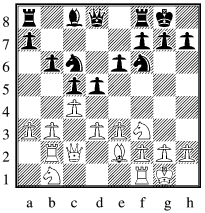
|
| RR v Stuart Ross after ... Nf6 |
All contributions gratefully accepted. Somehow I've reached 3 out of 4. I won't complain.
comment on this article
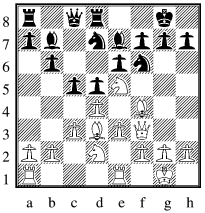
|
| Roger Greatorex v RR after 11 ... Rfd8 |
12 g4 Nxe5, 13 dxe5 Nd7, 14 Qh3 Nf8, 15 Rac1 Qd7
16 Nf3 Ng6 Like to have played Qc6 with threats on the h1a8 diagonal, but they don't work yet as far as I can see.
17 Bg5 Rac8, 18 Bxe7 Qxe7, 19 e4 trying hard to be aggressive, but overlooking ...
19 ... Nf4 winning at least a rook. 0-1
comment on this article